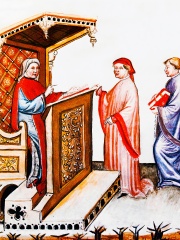

The Most Famous
PHYSICIANS from Iraq
This page contains a list of the greatest Iraqi Physicians. The pantheon dataset contains 726 Physicians, 2 of which were born in Iraq. This makes Iraq the birth place of the 41st most number of Physicians behind Azerbaijan, and Israel.
Top 2
The following people are considered by Pantheon to be the most legendary Iraqi Physicians of all time. This list of famous Iraqi Physicians is sorted by HPI (Historical Popularity Index), a metric that aggregates information on a biography's online popularity.

1. Abd al-Latif al-Baghdadi (1162 - 1231)
With an HPI of 66.22, Abd al-Latif al-Baghdadi is the most famous Iraqi Physician. His biography has been translated into 25 different languages on wikipedia.
ʿAbd al-Laṭīf al-Baghdādī (Arabic: عبداللطيف البغدادي; 1162, Baghdad – 1231, Baghdad), short for Muwaffaq al-Dīn Muḥammad ʿAbd al-Laṭīf ibn Yūsuf al-Baghdādī (Arabic: موفق الدين محمد عبد اللطيف بن يوسف البغدادي), was a physician, philosopher, historian, Arabic grammarian and traveller, and one of the most voluminous writers of his time.

2. Ibn Butlan (1001 - 1066)
With an HPI of 58.40, Ibn Butlan is the 2nd most famous Iraqi Physician. His biography has been translated into 19 different languages.
Abū 'l-Ḥasan al-Muḫtār Yuwānnīs ibn al-Ḥasan ibn ʿAbdūn ibn Saʿdūn ibn Buṭlān (Arabic: أبو الحسن المختار إيوانيس بن الحسن بن عبدون بن سعدون بن بطلان ; c. 1001 to 1025 – 8 Šauwāl 458 AH or 2 September 1066), commonly known as Ibn Buṭlān (ابن بطلان ), was an Arab physician and Nestorian Christian theologian. Born in Baghdad, the erstwhile capital city of the Abbasid Caliphate, he travelled throughout Mesopotamia, Syria, Egypt, and Anatolia, during which time he practiced medicine, studied, wrote, and engaged in intellectual debates—most famously the Battle of the Physicians with the Egyptian polymath Ibn Riḍwān. In 1054, he was in Constantinople, the capital city of the Byzantine Empire, where he witnessed first-hand the East–West Schism among Christendom, contributing a work to the discussions surrounding it for Michael I Cerularius, who was serving as the Patriarch of Constantinople. After his time in Constantinople, Ibn Buṭlān remained in the Byzantine Empire and eventually became a monk for the Greek Orthodox Patriarchate of Antioch amidst the end of the Macedonian Renaissance. He is most renowned for his work Taqwīm aṣ-Ṣiḥḥa (تقويم الصحّة , lit. 'Tabular Register of Health'), a handbook on dietetics and hygiene. It was named for its intricate tables, similar to those found within a Taqwīm as-Sana (تقويم السنة, lit. 'tabular register of the year'), a type of astrological almanac. He was the first person to use these tables in a non-astrological work, creating a new scientific writing format that may be seen as the main influence for works like Taqwīm al-Abdān fī Tadbīr al-Insān by the Arab physician Ibn Ǧazla and Taqwīm al-Buldān by the Kurdish geographer and historian Abū 'l-Fidāʾ. Translations of Taqwīm aṣ-Ṣiḥḥa into Latin are preserved in many manuscripts from the early modern period, and are thought to illustrate the relationship between medieval Europe and the Arab world in the field of medicine. Despite increased European contact with Egypt and Syria through the Crusades and trade into the 16th century, there are no Latin translations of Arabic medical texts after Ibn Buṭlān's era. Although he lived during a period when non-Muslims—the so-called People of the Pact, who were originally Jews, Christians, and Sabians—dominated the medical profession in the Arab world, Ibn Buṭlān is noteworthy for being one of only a few non-Muslim physicians from the region about whom enough is known to paint a detailed biography. Documents like the Cairo Geniza, a collection of Jewish manuscript fragments, provide scientific records about the medical practices of such physicians, but lack reliable information outside of that to create detailed biographies about them and to describe their perception and role within society, thus proving Ibn Buṭlān as an important exception.
People
Pantheon has 2 people classified as Iraqi physicians born between 1001 and 1162. Of these 2, none of them are still alive today. The most famous deceased Iraqi physicians include Abd al-Latif al-Baghdadi, and Ibn Butlan.

